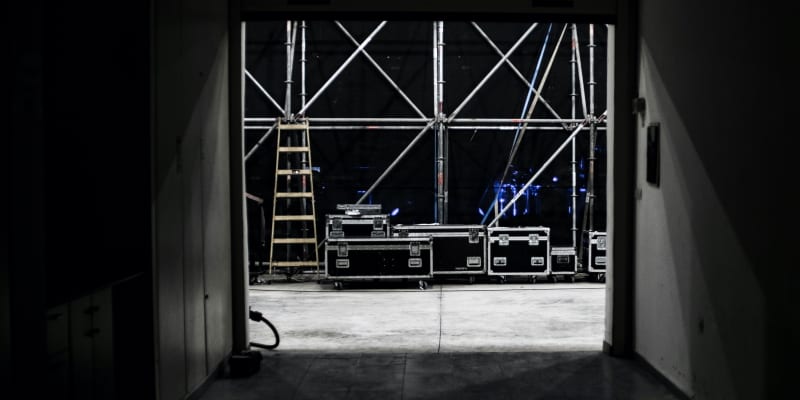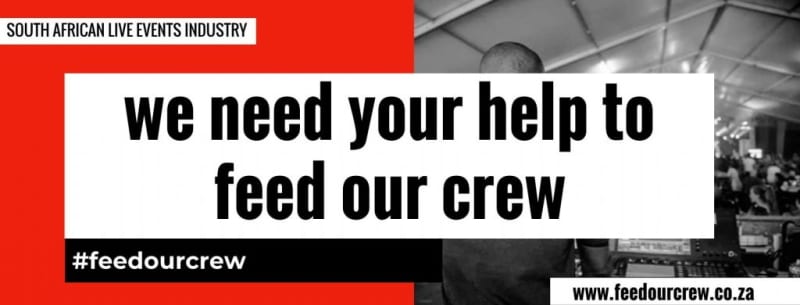Many of the men and women delivering technical production services at live events, be it conferences or music festivals, are freelancers. Like everyone in the events sector, they lost their livelihoods in March and its probable they will only be able to resume this line of work, gradually, in 2021. However, because of the nature of their work, they have little to no access to support or funding from government.
“The feeling that help was on the way, after the President announced various funds and aid opportunities, was short lived.”
Gomolemo Madumo, Managing Director of 16 Dope Barz Entertainment, says, “The feeling that help was on the way, after the President announced various funds and aid opportunities, was short lived.” Freelancers soon discovered that of the R500 billion that was made available to help South Africans survive the COVID-19 lockdown, almost none would trickle down to them.
Burden of proof
This was not an intentional oversight. Rather it is a consequence of the short hiring cycle that technical crew freelancers work within, which the National Departments of Sports, Arts and Culture (DSAC) has failed to recognise – despite many attempts by the sector to communicate this challenge to DSAC.
[A]s many freelancers point out, they pay taxes… Surely they are also entitled to some assistance while they are prohibited from working and earning money?
To qualify for a slice of the R150 million COVID-19 fund that DSAC earmarked for the professionals working under its umbrella, or the additional R50 million the provincial MECs made available, applicants needed to prove a loss of income. However, Madumo explains that, while artists, venues and production companies are booked well in advance of an event, freelancers are not. Most production houses permanently employ a skeleton crew and bring in freelancers as and when they are needed for each job, normally shortly before the event takes place. “For the average freelancer, it’s a week-to-week hustle, even day to day in some respects,” he says.
This means that beyond a handful of jobs, technical services freelancers simply cannot prove the value of the work they have lost over the course of the year – having never had the opportunity to secure it in the first place.

The UIF TERS programme, another safety net for those who are no longer receiving salaries, is similarly problematic. Freelancers do not typically create a registered a company (a costly and unnecessary process for the self-employed). This means they have never paid into UIF and are therefore not in its system.
In this light, it’s understandable that they cannot receive the UIF TERS benefit. But, as many freelancers point out, they pay taxes. SARS estimates this at 25% of earnings, although this is of course adjusted retrospectively, based on earnings. Surely they are also entitled to some assistance while they are prohibited from working and earning money?
Undervalued assets
“The events industry is globally valued at an estimated $1 trillion and contributes over R3 billion to South Africa’s GDP. How can we go un-acknowledged, un-appreciated and un-prioritized?” asks Madumo.
“The events industry is globally valued at an estimated $1 trillion and contributes over R3 billion to South Africa’s GDP. How can we go un-acknowledged, un-appreciated and un-prioritized?”
Kevan Jones, the executive director of the Southern African Communications Industries Association (SACIA), estimates that 65% of the individuals in the events industry are freelancers in this predicament. He – and others – have been doing their best to engage with DSAC to find out if some form of ongoing relief can be created for them. The Minister of Tourism, Mmamoloko Kubayi-Ngubane, announced a R30 million fund for freelance tour guides on 30 May 2020, so the predicament of freelancers has received some recognition, even if only within a single niche. Thus far, DSAC has been unresponsive to Jones’ efforts.
“We keep seeing announcements from DSAC in which they claim to be engaged in discussions with organised industry, but SACIA is the only SAQA-recognised professional body active in the creative industry and if we’re being ignored, I have to wonder who’s advising them.”
He says, “During early May we submitted several proposals to DSAC, including a proposal that they provide short term funding to assist those industry initiatives that had been set up to support individuals experiencing real hardship as a result of the shutdown. It’s almost as if our proposal disappeared into a black hole. We’ve not had any response to that proposal, nor have we had any meaningful response to other communication sent to the Department during the last 10 weeks. We keep seeing announcements from DSAC in which they claim to be engaged in discussions with organised industry, but SACIA is the only SAQA-recognised professional body active in the creative industry and if we’re being ignored, I have to wonder who’s advising them.”
Doing it for ourselves
Tamsyn Strydom, Technical Production Manager at MGG, says as soon as shutdown was announced she and some of her colleagues realised that the freelancers within her company’s community would be without work and support. As a result, Strydom and Madumo launched a campaign called #FeedOurCrew, together with Landy Yeatman, Duncan and Sherryn Riley, Kagiso Moima Wa Masimini, Sasha Raubenheimer, Marica Alves, Daria Higgens, Debra Batzofin and Vicki Whitehead.

The initial idea was to raise funds and give each qualifying freelancer R1 000. But very quickly the number of applicants in financial need far outstripped what they had anticipated, and they had to reduce this amount to R500 in order to help more people.
Since the campaign started, #FeedOurCrew has raised R314 729 from private finding. Of this, R293 000 has been distributed through 455 food vouchers to as many freelancers. Over a hundred more freelancers are on the waiting list – with more requests being submitted every day.
“The initial response was great, but since then we have found the donations have slowed down – while the need hasn’t.”
“The initial response was great, but since then we have found the donations have slowed down – while the need hasn’t. For example, all recipients have only ever received one payment, which is not enough for the four months and counting that we have been in lockdown,” says Strydom. She adds that, for many, this is the only support they have received during lockdown.
Without any prospects of work on the horizon, the future is uncertain for these individuals. Meanwhile the live events industry risks losing their skills and expertise, weakening its position for when events can resume.
If you are in a position to give, donations are hugely welcome at www.feedourcrew.co.za. People4Purpose (an unregistered NPO) manages all donations received, and issues shopping vouchers to successful applicants.
Another way to help is to follow their Facebook page here, and share their messages with your community.







